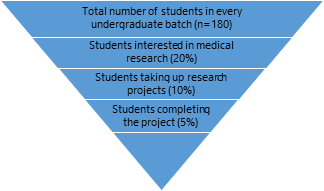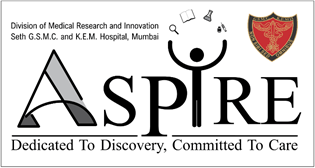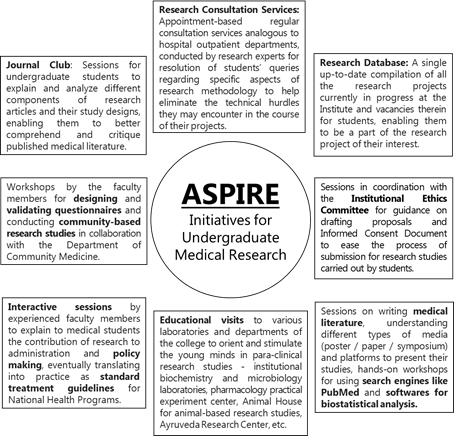Results of my survey regarding attitude of medical students towards research depicting high degree of attrition (based on data of undergraduate students of Seth GSMC and KEM Hospital; MBBS batches, 2015-2018).

Alhad Mulkalwar1
doi: http://dx.doi.org/10.5195/ijms.2022.1199
Volume 10, Number 1: 101-103
Received 04 09 2021: Rev-request 24 09 2021: Rev-request 22 10 2021: Rev-request 25 11 2021: Rev-request 19 01 2022: Rev-recd 25 09 2021: Rev-recd 24 11 2021: Rev-recd 13 12 2021: Rev-recd 20 01 2022: Accepted 18 02 2022
A student's mind is filled with multiple aspirations and fears. For every undergraduate, the path towards their M.B.B.S is an exciting journey of learning and self-discovery. There are many examples of noteworthy contributions by medical students during their studies –the discovery of heparin and the description of the sinoatrial node and pancreatic islets to name a few.1 Early research exposure also leads to improvement in the productivity of postgraduate research.2 However, research opportunities for undergraduate students are reported to be unsatisfactory and inadequate and little is known about the challenges students experience when conducting research.3
As a medical student passionate for research and having personally realized all that the world of research had to offer, I often wondered why an institute like mine, which produced many quality publications, had so few undergraduate students involved in research. I interacted with my teachers and colleagues to find out the reasons behind this discrepancy. Although many students seemed to be interested in being a part of research activities, few knew how they could start becoming involved. The students who did start a project seldom continued it until the end and very few eventually co-authored the publication (Figure 1). This attrition was found to be due to numerous factors including lack of supportive mentorship, conflict with the mainstream course work, or simply loss of interest.
Figure 1.Results of my survey regarding attitude of medical students towards research depicting high degree of attrition (based on data of undergraduate students of Seth GSMC and KEM Hospital; MBBS batches, 2015-2018).

I soon realized that the students needed to have appropriate guidance regarding different aspects of research. At first, I decided to start with something small, on an individual level, to educate my junior colleagues about the different approaches, opportunities and prospects regarding undergraduate medical research. I conducted informal group sessions to share my own research experiences, positive takeaways and the common challenges, pitfalls and dilemmas I faced in the process. Seeing the consistently positive results over three years, I realized the need of a formal institution that could guide the undergraduate students through their research paths. Hence, I decided to establish, in my institute, a department called the Association for Support and Propagation of Innovation, Research and Education (ASPIRE); with the intent of supporting and nurturing the curiosity of young medical students (Figure 2). This article summarizes my personal experiences as I navigated my way through the tumultuous path to graduation, and more specifically, the lessons from my unique endeavor of ASPIRE.
Figure 2.ASPIRE - Association for Support & Propagation of Innovation, Research & Education.

To bridge the existing gaps of research knowledge and opportunities among the undergraduate medical students of the institute, a proposal to establish a student led research council, named ASPIRE, was drafted with the following aims & objectives:
The specific mechanisms proposed to achieve the above objectives have been summarized in Figure 3. I knew this was not going to be an easy journey. Theoretically, the idea of this new department seemed simple, but altering the status quo at the institution was sure to invite opposition. In my early days as a student, I was not very good at handling failures and often they had a negative impact on my health; which is why most of my colleagues and close friends warned me against this risk. At times, I was willing to give up on this project before starting due to fear of what may happen and the possibility of failure. However, I realized that not trying was a certain way of failing. I decided it was at least worth a try. Not knowing where to start, I spoke to a few approachable faculty members with whom I had worked with previously. They acknowledged the need for such a platform but were also apprehensive regarding its feasibility and the bureaucratic hurdles that may interfere in its implementation. I met with all the senior professors of the college personally to explain the idea and at the same time incorporate their suggestions to better the model. Although I faced initial resistance, slowly the initiative started garnering support. After almost a year's hard work, I was allowed to present the idea at our Annual General Body Meeting, where the proposal passed with an overwhelming majority. ASPIRE thus became one of India's few student-led Medical Research and Innovation bodies. Today, it is one of the institution's most active organizations, having launched multiple initiatives to improve the awareness about medical research and guiding students along their own research journey.
Figure 3.Initiatives Proposed Under ASPIRE to Promote Undergraduate Medical Research.

On a personal level, the gratification for me was not as much for establishing this organization per se, but the ability it gave me to believe in the strength of persistence, patience, and optimism. The journey of this small endeavor was merely one of many enriching experiences I have witnessed throughout studying for my M.B.B.S. I am barely able to remember how shy and introverted I was when I started off my medical school journey. I had spent the better part of my childhood consciously avoiding the tough paths, and thereby avoiding mistakes and failures. It is only now that I realize the importance of risks and failures in personal growth. My advice to all would be to act on their ideas, no matter how uncertain and precarious the journey may seem. Do not let the comfort of inaction rob you of potential greatness. You never know what prospects are in store for you.
These experiences made me realize my love for administration and diplomacy, which eventually led me to quit the field of medicine post-M.B.B.S. to pursue a career in Indian diplomacy. This was not an easy decision. I will admit it is scary starting this new chapter of my life; but I will do it anyway because although I am afraid of failure, I am even more terrified of regret. You do not need to be fearless, just do not let fear overrun your desire to move past it.
When I envision my career, I choose to focus on the opportunity and not the obligation. I might fail at some point in time, but my undergraduate days taught me to not give up on my goals. So when asked, “Are you really going to change your career despite completing a lengthy and tough degree like M.B.B.S.?” I simply like to reply, “I have finally realized my passion and courage only because of the experiences in my M.B.B.S.”
Not having a vision for our lives is the greatest disservice we can do to ourselves. Let every choice and decision of your life be an informed and conscious one. Unfortunate events and setbacks are bound to befall us, and more often than not we will not have a say in these instances. Nevertheless, our success lies in the ability to not give up, and the choice between giving up and going, that is completely in our hands.
It is not easy, but it will definitely be worth it.
None.
The Authors have no funding, financial relationships or conflicts of interest to disclose.
Conceptualization, Writing – Original Draft Preparation, Writing – Review & Editing: AM.
1. Brass LF. Is an MD/PhD program right for me? Advice on becoming a physician-scientist. Mol Biol Cell. 2018;29(8):881-5.
2. Reinders JJ, Kropmans TJ, Cohen-Schotanus J. Extracurricular research experience of medical students and their scientific output after graduation. Med Educ. 2005;39(2):237.
3. Murdoch-Eaton D, Drewery S, Elton S, Emmerson C, Marshall M, Smith JA, Stark P, Whittle S. What do medical students understand by research and research skills? Identifying research opportunities within undergraduate projects. Med Teach. 2010;32(3):e152-60.
Alhad Mulkalwar, 1 M.B.B.S (Bachelors Degree in Medical Sciences), Intern, Seth Gordhandas Sunderdas Medical College and King Edward Memorial Hospital, Mumbai, India.
About the Author: Dr. Alhad Mulkalwar has completed his graduation and currently working as an Intern (M.B.B.S.) at Seth G.S.M.C. and K.E.M. Hospital, Mumbai, India. He is a recipient of the Indo - Asian Jonas Salk Young Scientist Award in Medical Sciences and the Indo-Pacific Edward Jenner Distinguished Innovative Scholar Award by the International Multidisciplinary Research Foundation in collaboration with United Nations 75th Anniversary Dialogue on U.N. Sustainable Development Goals, 2020. He has also received the International Young Researcher Award in Medical Science by the Center for Professional Advancement, West Midlands, United Kingdom.
Correspondence: Alhad Mulkalwar. Address: Acharya Donde Marg, Parel East, Parel, Mumbai, Maharashtra, India. Email: alhad.mulkalwar@gmail.com
Editor: Adam Urback. Student Editors: Muhammad Romail Manan & Shuo-Yan Gau. Proofreader: Ciara Egan. Layout Editor: Francisco J. Bonilla-Escobar. Process: Peer-reviewed.
Cite as: Mulkalwar A. ASPIRE - A Journey from Intuition to Innovation. Int J Med Stud. 2022 Jan-Mar;10(1):101-103.
Copyright © 2022 Alhad Mulkalwar
This work is licensed under a Creative Commons Attribution 4.0 International License.
International Journal of Medical Students, VOLUME 10, NUMBER 1, Jan-Mar 2022